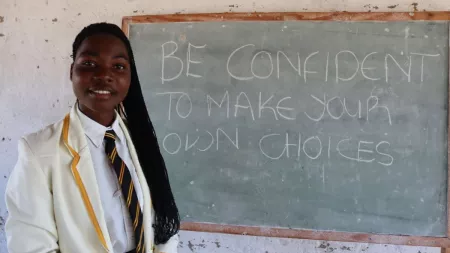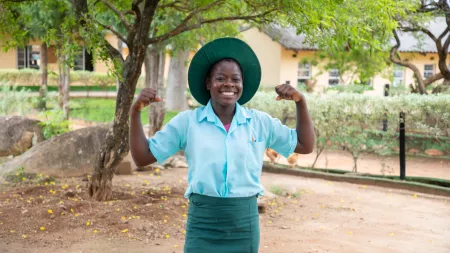Ropafadzo Chidzabwe says, “As a peer leader I am teaching girls to be confident and to make decisions that build their future. Everyone should be able to say no and not be passive. This has brought discipline at school and both boys and girls are now more confident to report abuse. Both boys and girls now understand the importance of education and dreaming bigger."
Dreaming bigger is only part of the solution. It’s important to help people find better options.
There were too many child marriages and school dropouts in our community, not to mention gender-based violence, poverty and hunger which left many with no choice but to send off their adolescent girls even into polygamous marriages. Many of the people were unemployed and had no jobs. This made child marriages a very lucrative practiceNyika Homora—a male champion who is working to end child marriage in his community.
The $0.9 million World Bank-funded pilot project is supported by the Ministry of Public Service, Labor and Social Welfare, the Ministry of Finance and Economic Development, Ministry of Primary & Secondary Education (in charge of schools where BEAM supported learners are found), the Ministry of Health and Child Care (for technical support around WASH). The project ran from January through September of 2022. The pilot supported 1007 adolescent girl learners from 48 secondary schools in the Buhera district of Manicaland, Zimbabwe.
What changed?
- Girls went back to school. The proportion of adolescent girls on the project attending all days of school increased from 29% at baseline to 44% by May 2022.
- Girls got the tools they need to manage menstruation. Personal hygiene improvements due to the distributed soap, towels, masks and cash led to purchasing of lotions, new uniforms and shoes.
“We also realised that a lot of these practices came from lack of knowledge and access to income and no family wanted to go hungry or live with malnutrition, so education was not an option when there was no food on the table.”
How did we get there?
- Supporting families’ basic needs. The project used cash through mobile money transfers directly to learners’ households for them to buy basic household needs, especially food and education-related materials such as uniforms and stationery. Food insecurity is one of the major drivers of early marriages and absenteeism among adolescent girls, so basic support to buy food helped girls go back to school.
- Addressing girls' hygiene needs. The project distributed sanitary pads, bath soaps, undergarments and towels so girls could be confident staying in school all month long.
- Engageing men and boys as champions. Nyika is one of 24 male leaders and village heads who is helping change other people's minds about child marriages.
- Thinking about social norms. The project paired all distributions (in cash or in kind) with the training of household heads around gender budgeting, positive parenting and spending to support girls’ education.
- Helping families build more sustained incomes. The project disbursed business grants of $125 to each family to start income generating projects at household level so they can maintain incomes and their new spending patterns once the project is finished. Martha Rapingwa used her grant to start a small bakery. Other people are buying livestock and chickens to earn an income.
- Set up local supply lines. The project is establishing Community Pad centres that are making sanitary pads so that even after the project has ended, adolescent girls and women in general will continue to have access to readily available, re-usable and affordable pads. So far, 6 groups have been identified for 6 school communities.
Want to learn more?
Check out the stories the team is posting: https://www.facebook.com/carezimbabwe/

CARE International’s work in Zimbabwe focuses on empowering women and girls, increasing food security and resilience and responding to emergencies. This work aims to address longer-term development issues within communities.
Read more on our work in Zimbabwe